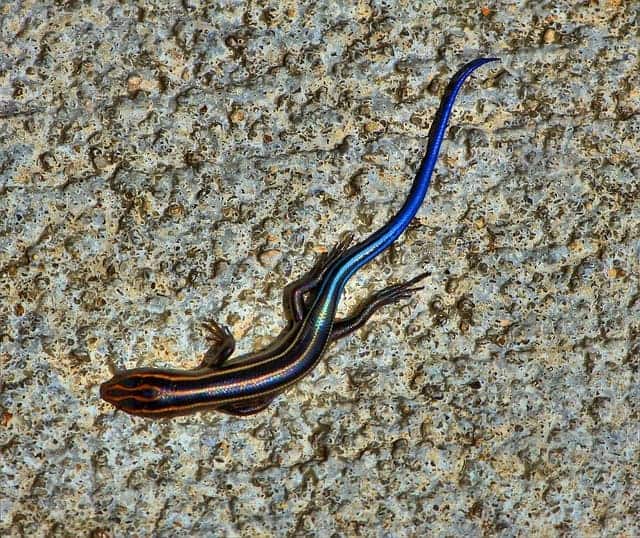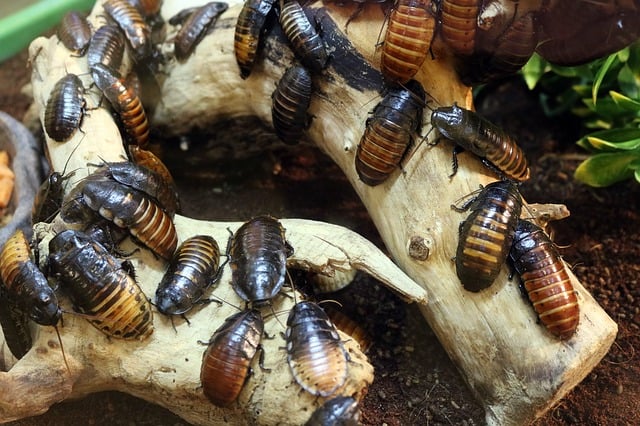Are Blue Tailed Lizards Poisonous?
Could be you have come across Blue Tailed Lizards in your home, yard or zoo and wonder whether they could be poisonous. Can these reptiles really harm your children, dogs, cats or other home occupants? May be you are even worried how dangerous their saliva or bite could be.
Well, the question here is, are Blue Tailed Lizards Poisonous? The direct answer is NO. Blue Tailed Lizards are humble, non- poisonous reptiles that will present no threat to your children, humans or pets such as dogs and cats since their bite do not contain venom.
According to Savannah River Ecology Laboratory, there is no scientific record that shows a long lasting effect of a bite from a Blue Tailed Lizard on human or pet. Nevertheless, some sources claim that when eaten by cats or dogs, Blue Tailed Lizards may cause sickness and lead to death.
[amazon bestseller=”Best Lizard Cages” items=”2″ template=”table”]Related: Do Lizards Have Teeth?
Details: Are Blue Tailed Lizards Poisonous?
Bites from Blue Tailed Lizards are not poisonous. These animals are humble and peaceful reptiles that rarely attack their enemies. Though Blue Tailed Lizards can bite, their saliva and injections do not contain venom. Moreover, their bite forms mild injuries that don’t last for long (one to three days).
1. So, are Blue Tailed Lizards Poisonous to human beings?
a. Humans and Blue Tailed lizards.
No. The Blue Tailed Lizards has no threat to human beings. Though they can bite, if provoked, the bite from these reptiles are harmless since they do not contain venom. According to Savannah River Ecology Laboratory, there is no scientific record showing a long lasting injury resulting from a Blue Tailed Lizard’s bite.
Mostly, the blue tailed lizards uses their tails to attack or keep off their enemies. These reptiles rarely attack children or adults. Your children may have ample time with these reptiles as they show positive and friendly reactions when socializing with human beings. In fact, Blue tailed lizards love to climb over humans and being held by hands thus can be as a nice pet for you and your humans. However, Blue Tailed Lizards will tend to run away if they detect any threat from human beings.
Blue Tailed Lizards are, in fact, beneficial to humans since they feed on small insects, mealworm, small bugs and spiders, which may be dangerous to you, and your humans.
b. Effects of Blue Tailed lizards on pets.
Blue Tailed Lizards are small reptiles that are easier to be caught by you cats and dogs. Though most species of lizards are not poisonous, Blue Tailed Lizards may not be 100% safe for your pets.
Blue Tailed Lizards carry liver fluke in them. These internal parasites have no effect on Blue tailed lizards. However, when eaten, these liver fluke find their way into your pets’ digestive track.
The liver flukes will then travel to the liver, bile duct and finally into the gall bladder where it matures in 7 to 13 weeks. The adult liver fluke will cause serious damages such as liver inflammation and also block the bile duct.
Presence of liver fluke in your pets is shown by symptoms such as sudden loss of weight, vomiting, lethargy, loss of appetite, swollen abdomen, diarrhea and yellow eyes.
Blue Tailed Lizards also harbor salmonella bacteria. These bacteria are dangerous to your pets as they make them ill if they find their way into your kennels.
They cause infections, which lead to severe sickness. Blue Tailed Lizards may hide in the gaps and roof of your pets’ kennel from where is drops these bacteria when the pets are away or asleep.
Pets affected by salmonella bacteria shows symptoms such as lethargy, vomiting and bloody diarrhea. You must therefore keep your kennels disinfected against salmonella and blue trailed lizards.
Related: Are Monitor Lizards Poisonous?
Will Blue Tailed Lizards be Poisonous to Cats?
Bites from the Blue Tailed Lizards won’t cause any poisoning to your cat since it contain no venom. However, scientific research shows that, a Blue tailed Lizard may bring salmonella bacteria, which may cause bacterial infections on your cat.
Some sources states that, when your cat eat Blue Tailed Lizard, it may fall sick and even die if not treated. Moreover, Blue Tailed Lizards will transmit liver flukes to your cat. The sick cat will show symptoms such as loss of balance, crossed eyes, dizziness, paralysis hypersalivation, vomiting, loss of coordination, fever or even loss of appetite. In case you notice your cat having such symptoms, seek medication from veterinary.
Normally, Blue Tailed Lizards will try to escape in case the see a cat since most cats tend to feed on them. Though some species of lizards may not be poisonous to your cat, it is necessary to keep off your cat from any access to Blue Tailed Lizard.
Can Blue Tailed Lizards Be Poisonous to Your Dogs, then?
No. The blue tailed lizards will rarely bite the dogs. Instead, the reptile tends to escape once it sees a dog as it fears being eaten. Blue tailed lizards do not contain venom and their bites cause no injuries on your dog (has no strong teeth).
Blue Tailed Lizards may bring Salmonella Bacteria in your kennel, which may cause bacterial infection on your dog’s skin. In case your dog feeds on the BlueTailed Lizard, it may generate some complications. In addition, you dog may acquire liver fluke from Blue Tailed Lizards.
Sources says that the dog may show symptoms such as dizziness, movement imbalance, fever, loss of appetite, or crossed eyes. If you notice such symptoms on your dog, kindly seek urgent medication from a dog professional or veterinary. It is important to keep of your dogs from any Blue Tailed Lizard in your area.
Will cats and dogs eat Blue Tailed Lizards?
Absolutely! Cats and dogs hunt for blue tailed lizard and feed on them since they are small and easier to catch as compared to other animals – they don’t run fast when in danger.
Mostly, the cat highly feeds on these lizards since it is able to climb walls and roofs to attack them right in their hideouts. Dogs, on the other hand, hunt blue tailed lizards in open fields/rocks and bushes where they hide among other species.
As stated above, blue tailed lizards may not be 100% present safe for your pets unlike other lizard species. It will transmit liver fluke to your pets, causing severe destruction if not quickly treated.
Pets hunting Blue tailed lizards crawl on the ground as they focus on a certain point/route – possibly waiting for blue tailed lizards to pass. If you notice such signs with your pets, the prey may be in the vicinity.
Ensure you protect your pets (cat and dog) from eating Blue Tailed Lizard as much as possible – is an efficient way of preventing them from liver flukes.
Related: What Does a Garden Lizard Eat?
How to Prevent Your Pets (Cats & Dogs) From Eating Blue Tailed Lizards
Naturally, Pets such as dogs and cats will eat blue tailed lizards if not stopped. You can use the following ways to prevent pets from eating these reptiles:
1. Secure your compound. Lizards are able to climb walls easily. They can penetrate your home through very tiny holes.
Ensure you block these entrances and over loop your wall top to prevent them from climbing over. You can use mesh wires with very tiny holes to seal ventilations and gaps in your home.
2. Keep your pets (cat and dogs) indoors or secure. Locking you pets is the best way of preventing them from eating Blue Tailed lizards.
Cats and Dogs are predators that will eat any lizard they come across. It is important that you feed them from their kennel. Keep watch the movement of your pets every time you release them from their kennel.
3. Train your pets not to eat blue tailed lizards. You can catch a blue tailed lizard and train you pets not to feed on it. You must do the training for longer time to make your pets familiar – this means it’s a time consuming way.
4. Keep your pet lizards away from dogs and cats. You can secure safely your pet lizards so that cats and dogs do not eat them. Lock the cage where you feed your blue tailed lizard pets and let it be far away from dogs and cats kennels.
When playing with your blue tailed lizard pet, keep off your dogs and cats as they may grab and eat it. Or else, you can train your dog and cat to be friendly with your blue tailed lizard pet– this may not be easy.
Conclusion
Blue Tailed Lizards are not poisonous. They may not harm you children, pets and other humans by their bite since they have no venom.
Though these reptiles can bite, when they feel threatened, the bite mark does not last long (2 to 3 days).
Blue Tailed Lizards contain liver flukes and may transmit them to your pets when eaten causing severe damage in the liver. Protect your pets from eating Blue tailed lizards for their health safety.







